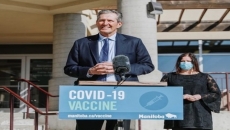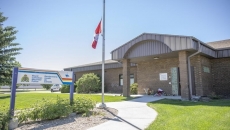Ottawa will continue sending humanitarian and development assistance to Afghanistan after the United States completes its troop withdrawal from the country next month, International Development Minister Karina Gould says.
U.S. President Joe Biden said last week the U.S. military operation in Afghanistan will end Aug. 31, nearly 20 years after the United States and its allies took down the Taliban government in Kabul.
Biden pushed back against the notion the U.S. mission has failed but also noted it was unlikely the Afghan government would control all of Afghanistan after the U.S. leaves.
He urged the Afghan government and the Taliban, which he said remains as formidable as it did before the start of the war, to come to a peace agreement.
Gould said in an interview that Canada is constantly monitoring and evaluating the situation through dialogue with its partners including non-governmental organizations and United Nations agencies.
"At this point in time, our partners continue to work and deliver services for the Afghan people."
She said Ottawa is providing humanitarian assistance to the Afghan people, as 50 per cent of Afghans rely on such help for basic necessities.
On Friday, the Taliban claimed it now controls 85 per cent of Afghanistan's territory amid a surge in wins on the ground as American troops continue their pullout from the country.
The announcement came at a press conference at the end of a visit by a senior Taliban delegation to Moscow to offer assurances that the insurgents’ quick gains in Afghanistan do not threaten Russia or its allies in Central Asia.
The Taliban promised not to attack provincial capitals or seize them by force, and expressed hopes for a “political resolution” with Kabul.
Gould said she is concerned about the rise in attacks on humanitarian workers and the civilian population recently.
But she said it's unlikely the Taliban is controlling 85 per cent of the country.
"Certainly they have made some gains, but it's not, from our perspective, as large as what they are claiming," she said. "They might be inflating their numbers when in actual fact they don't control that amount of territory."
Global Affairs Canada spokesman Grantly Franklin said Ottawa calls for a permanent and comprehensive ceasefire to end the interminable suffering of the Afghan people and facilitate provision of humanitarian assistance.
"Canada’s engagement in Afghanistan prioritizes peace, democracy and human rights," he said in a statement.
According to government data, about 40,000 Canadians served in Afghanistan from 2001 to 2014, with Canada providing a total of $3.6 billion in aid to the country since 2001.
Canada’s efforts in Afghanistan have contributed to a real improvement in the lives of the most vulnerable, Franklin said. "Women and children in particular have better access to education, health and human rights, and Canada will do its utmost to preserve these gains."
In November, Canada pledged $270 million in additional development assistance through 2024.
Roland Paris, director of the graduate school of public and international affairs at the University of Ottawa, said much of Canada's assistance now goes to supporting the Afghan security forces and to development projects aimed at improving conditions for women and girls.
"Unfortunately, the women and girls that our development assistance has targeted are particularly vulnerable if the Taliban continues to spread its influencing control," he said.
"It really depends on how the Taliban behaves, but its track record is not encouraging, to say the least."
He said there's very little Canada can do if the Taliban continues expanding its territory.
"Canada doesn't have very much influence there," he said. "If the U.S. and its allies were unable to gain control of the situation with 130,000 troops, how much can Canada do with zero troops on the ground?"
Ferry de Kerckhove, a former Canadian ambassador in Pakistan, Indonesia and Egypt, said Canada doesn't have a real foreign policy in Afghanistan and can't do anything about the U.S. withdrawal.
"I'm sorry to say it as a former Canadian diplomat, I think Canada doesn't matter much in that ballgame."






